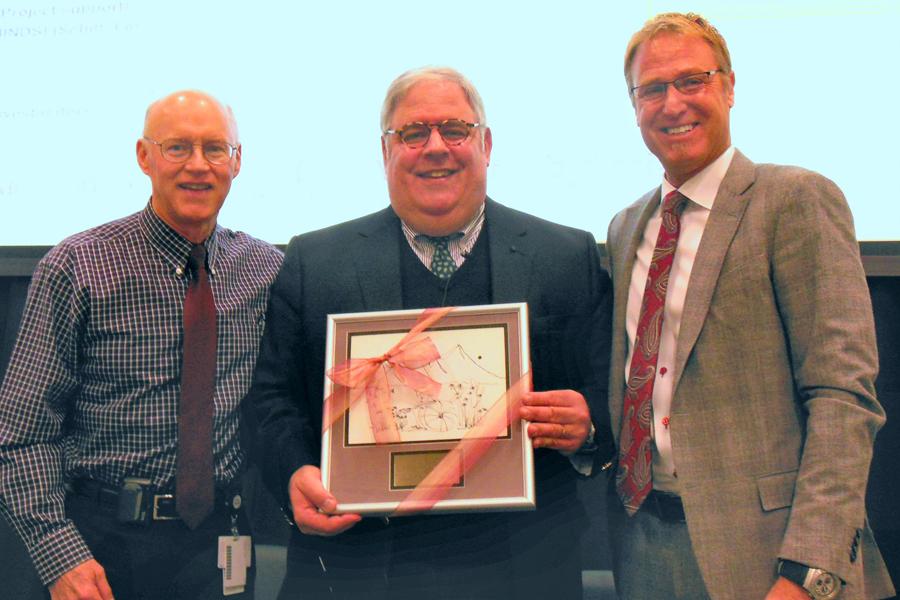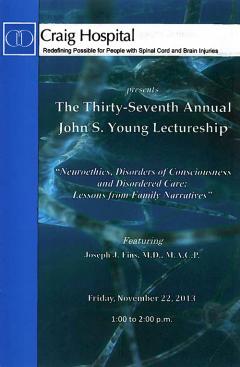Dr. Fins Receives Distinguished Lectureship, Publishes Scholarly Paper, and Pens an Upcoming Book, Rights Come to Mind

Dr. Fins (center) receiving plaque as the 37th Annual John S. Young Lectureship at Craig Hospital in Denver, accompanied by Drs. Thomas Balazy (L) and Alan Weintraub (R)
Joseph J. Fins, MD, MACP, Chief of the Division of Medical Ethics, recently received the 37th Annual John S. Young Lectureship for which he spoke at Denver's Craig Hospital, a premier rehabilitation facility for patients with spinal cord and brain injuries. This prestigious lectureship highlights the Craig Hospital's tradition of not viewing those with traumatic spinal cord and brain injury as "lost causes." Dr. Fins is the E. William Davis, Jr., M.D. Professor of Medical Ethics, Professor of Medicine, Professor of Public Health and Professor of Medicine in Psychiatry. He is an elected Member of the Institute of Medicine of the National Academy of Sciences and a Fellow of the American Academy of Arts and Sciences.
Dr. Fins's lectureship incorporated recent findings based on a multi-year IRB-approved study of family experiences with severe brain injury. Fins and colleagues have interviewed nearly 50 families who have come to Weill Cornell and Rockefeller University to participate in studies conducted by the Consortium for the Advanced Study of Brain Injury (CASBI) designed to elucidate mechanisms of recovery. Fins co-directs CASBI with Weill Cornell neurologist, Dr. Nicholas D. Schiff, who is the Jerold B. Katz Professor of Neurology and Neuroscience.

In tandem with these scientific studies, Fins and colleagues have interviewed nearly 50 families, the patient's surrogate decision-maker, with many interviews conducted over many visits. Surrogate decision-makers are those family members and caregivers who must navigate a challenging healthcare system on behalf of their loved ones, and in this case, for patients who have suffered severe brain injury. When a patient experiences disorders of consciousness due to a brain injury, whether minimally conscious (MCS) or vegetative (VS), heart-wrenching decisions have to be made by family and/or caregivers. These cases are typically complex, and in a recent scholarly article written by Dr. Fins in the Archives of Physical Medicine and Rehabilitation (ACRM), the implications are evaluated from a medical ethics perspective. The article covers the many challenges faced: diagnostic accuracy; resuscitation; barriers to care under current insurance policy; and under the implementation of the Affordable Care Act.
The same personal narratives that Dr. Fins utilized for the article in ACRM are also the inspiration and foundation of his upcoming book, entitled, Rights Come to Mind: Brain Injury, Ethics, and the Struggle for Consciousness (Cambridge University Press). The book examines the ethical considerations involved in treating patients with severe brain injury from the family's perspective, but through the discerning eye of a physician-ethicist. He also stakes out what society owes these patients, invoking a human rights argument. As Dr. Fins states in his ACRM article, "The voices of families, sometimes schooled, sometimes not, deserve a hearing so as to demonstrate that there are human consequences to a level of neglect that we still accept as a standard of care." Dr. Fins new book is expected to arrive in the fall of 2014. In the fall of 2013, he presented a related talk on the subject when he served at his alma mater as the first Kim-Frank Visiting Writer at "Writing at Wesleyan."
Dr. Fins's scholarship has been funded by a Health Policy Investigator Award from the Robert Wood Johnson Foundation and additional support from the Buster Foundation and the Jerold B. Katz Foundation.
Related Links
Paper in Archives of Physical Medicine and Rehabilitation
Video from "Writing at Wesleyan" Lecture Series

